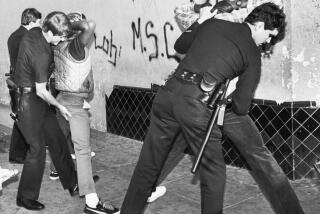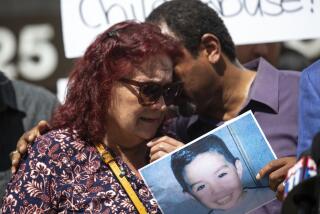Editorial: Setting rules for isolation in juvenile halls
It’s inherent in the nature of the juvenile justice system that there will be young people under stress, distraught, afraid, angry, in pain, at odds with others, perhaps suffering mental illness and requiring a brief period away from the classes or other programs that are part of daily life in juvenile halls and probation camps.
But that isolation must be imposed only for the right reasons and only for limited periods of time, or it becomes punishment — criminal solitary confinement of the kind already overused in the adult prison system. Numerous instances of such improper, punitive confinement have been reported around the state, and California law allows counties too much leeway in defining for themselves just when separation for the health and well-being of the juvenile and others in the camp crosses the line into punishment.
The probation system is not supposed to be a network of youth prisons. Its purpose, under law, is not punishment, but rehabilitation in the form of counseling, care and education.
Isolation can quickly degrade the already damaged mental health of a young ward and undermine the mission of the juvenile probation system. Bills to better regulate the practice and end its use as punishment have been introduced in the state Legislature only to die in committee. State Sen. Mark Leno (D-San Francisco) is trying again with SB 124. It calls for very modest, incremental yet crucially important changes that would help limit the damaging misuse of isolation. Having cleared the Senate, the bill is now making its way through the Assembly. Lawmakers should pass it.
Probation officials would still be allowed to separate a minor from the general population of the hall or camp for up to four hours for the purpose of safety and mental health evaluation. There must be at least an attempt to return the minor to class or other program by the end of that period, but officials would be allowed to impose an additional four hours of isolation if they deemed it necessary.
Gone from the bill are many of the mandates that the state corrections officers and county probation officers unions and associations cited as too onerous in previous iterations. That’s a shame, because the standard should be the well-being of the ward, not the convenience to the officials. More stringent restrictions on isolation are probably warranted.
Still, the bill is based on a survey of national best practices and court settlements that have ended the use of long-term solitary confinement for juveniles. It is a small step in the right direction.
Follow the Opinion section on Twitter @latimesopinion and Facebook
More to Read
A cure for the common opinion
Get thought-provoking perspectives with our weekly newsletter.
You may occasionally receive promotional content from the Los Angeles Times.






